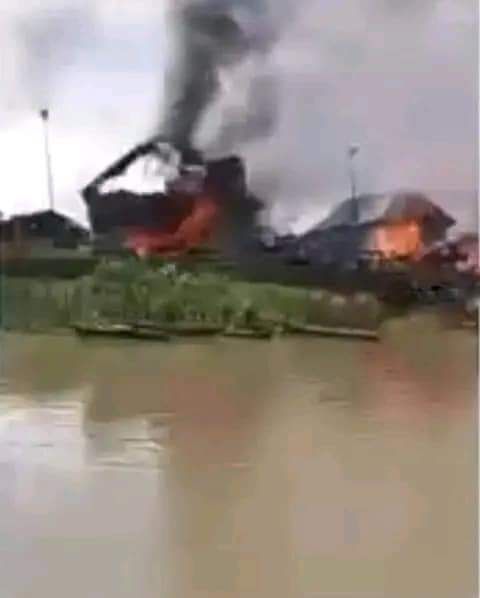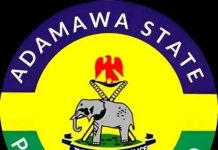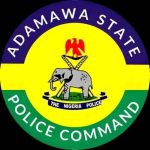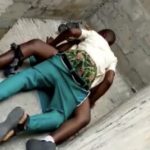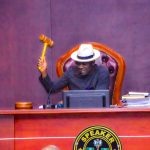The Human Rights Writers Association of Nigeria (HURIWA) has issued a stern rebuke against the Nigerian Defence Headquarters, accusing it of flagrant violations of the constitution in its recent actions in Delta State.
The National Coordinator, Comrade Emmanuel Onwubiko, stated this in a release on Friday April 5, 2024.
The accusation comes in light of the military’s extensive operations, including the declaration of wanted persons and the blockade of communities, which HURIWA argued exceed the military’s legal jurisdiction.
The foremost civil rights advocacy group’s statement follows a series of events in Okuama, Delta State, where 17 military personnel were reportedly brutally killed, allegedly by residents of the community.
In response, the Defence Headquarters had declared eight individuals wanted and imposed a blockade on Okuama, citing the need for a thorough search operation to recover arms and ammunition.
However, HURIWA contended that such actions by the military represent a blatant disregard for constitutional boundaries and fundamental human rights.
According to the association, the military’s role is to defend the nation from external threats and assist civil authorities when necessary, but not to assume policing powers or administer justice within civilian communities.
At the heart of HURIWA’s accusation lies the principle of constitutional supremacy, which dictates that all actions of the government and its agencies must be by the provisions of the Constitution.
In this regard, the association pointed to several key constitutional provisions that it argued have been violated by the Defence Headquarters’ actions.
First and foremost, HURIWA emphasized the principle of separation of powers articulated in Sections 4, 5, and 6 of the Constitution, which delineates distinct roles and responsibilities for the executive, legislative, and judicial arms of government.
According to HURIWA, the military’s engagement in law enforcement activities in Okuama represents a breach of this principle, as law enforcement duties are constitutionally reserved for civilian agencies, particularly the police.
“Section 214(1) of the Nigerian Constitution expressly provides for the establishment of a civilian police force responsible for maintaining law and order within the country.
By taking on law enforcement roles in Okuama, the military is not only exceeding its constitutional mandate but also undermining the civilian authority vested in the police force.
“Section 214 of the 1999 Nigerian Constitution reads: There shall be a Police Force for Nigeria, which shall be known as the Nigeria Police Force, and subject to the provision of this section no other Police Force shall be established for the Federation or any part thereof”.
Furthermore, HURIWA highlighted the constitutional guarantee of the right to freedom of movement, as enshrined in Chapter 4, Section 41 of the Constitution.
“The blockade imposed by the military on Okuama effectively restricts the movement of residents, infringing upon their constitutionally protected rights without due process of law.
“Section 45 of the Constitution also guarantees the right to freedom from discrimination, prohibiting any form of discriminatory treatment based on ethnicity, religion, or other status.
“Our utmost concern is that the military’s actions in Okuama may disproportionately target certain communities or individuals, potentially leading to further violations of this constitutional right”.
Additionally, HURIWA raised questions regarding the military’s declaration of wanted persons and the imposition of penalties outside the framework of civilian law.
While the Constitution allows for the military to be subject to military law during times of war or emergency, HURIWA argued that such measures must be proportionate and subject to judicial review to ensure compliance with constitutional standards of due process.
Furthermore, HURIWA highlighted the potential for abuse and human rights violations in the military’s actions, particularly in the absence of civilian oversight and accountability mechanisms.
In light of these constitutional concerns, HURIWA called for the immediate cessation of the military’s operations in Okuama and urged the government to uphold the rule of law in addressing security challenges.
The association emphasized the importance of respecting constitutional boundaries and safeguarding the rights and freedoms of all Nigerians, regardless of the circumstances.
The association also called upon relevant authorities, including the National Assembly and the judiciary, to intervene and ensure that the military operates within the confines of the law, thereby upholding the sanctity of the Nigerian Constitution and the rights of its citizens.
“It is imperative that the Defence Headquarters immediately cease its operations in Okuama and respect the rule of law. The Nigerian Constitution serves as the supreme law of the land, and all actions of the government and its agencies must be consistent with its provisions.
Any deviation from constitutional norms not only undermines the legitimacy of government institutions but also threatens the rights and freedoms of all Nigerians”, HURIWA concluded.

